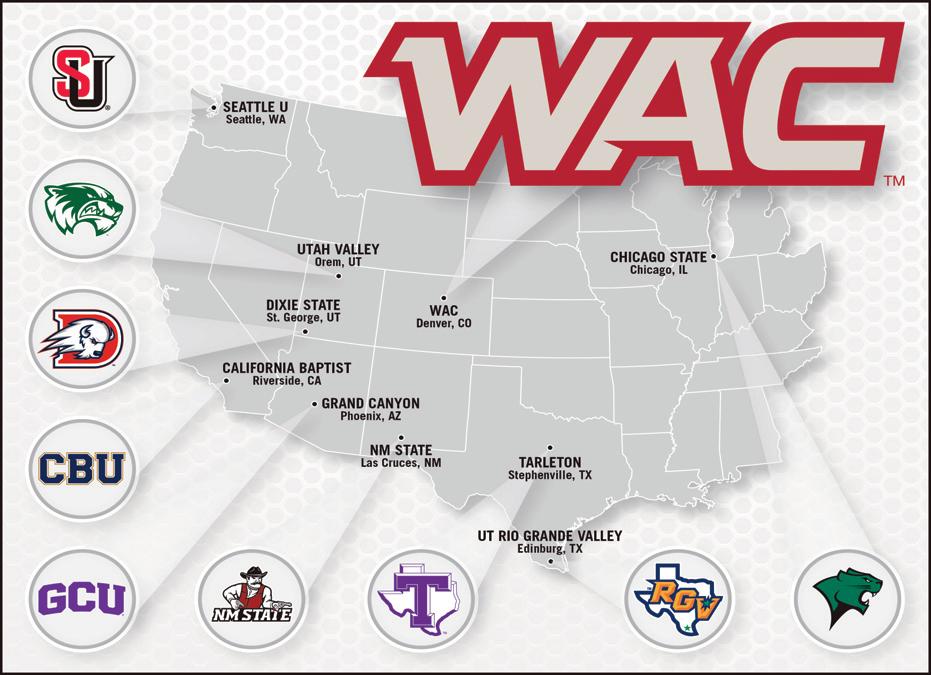
4 minute read
WAC Tournament • Las Vegas 2021
SINCE 1962
After completing its 58th year of intercollegiate competition, the Western Athletic Conference continues to evolve and feature some of the nation’s best programs. One thing that remains unchanged is the persistent nature of the schools in the WAC to advance their programs to contend at the top levels of the NCAA.
The WAC provides its student-athletes the chance to travel to scenic destinations and gain exposure in some of the nation’s most diverse markets and largest metropolitan cities. In addition, the WAC’s student-athletes work to achieve the highest levels of success with the academic support of their respective institutions.
CONTINUED SUCCESS
The WAC has experienced tremendous success over the years. In men’s basketball, the WAC has sent at least two teams to the NCAA Tournament in 28 of the past 45 seasons. In baseball, the WAC has boasted two national champions since 2003. In women’s basketball, the conference has had at least two teams qualify for the NCAA Tournament 10 times in 28 seasons, with a record five teams in 1998. The WAC also sent teams to three BCS football bowl games from 2007-10.
In 2014, the conference launched the WAC Digital Network giving fans access to watch hundreds of games live on the internet. The WDN streams live events including soccer, volleyball, basketball, swimming and diving, indoor track and field, softball and baseball. In addition, the WDN produces championship events from soccer, volleyball, basketball, softball, indoor and outdoor track and field and baseball, including those airing on ESPN+. The WDN also produces the franchise features, “#WACtopPlay,” “WAC60,” “WAC in the Day,” “WAC AllAccess,” “The Road to #WACvegas,” and “The WAC Podcast.” The Learn-Compete-Inspire series is also featured on the WDN, telling stories of triumph and inspiration from around the conference.
HISTORICAL SIGNIFICANCE
The WAC’s history traces back to July 27, 1962, when the original six-team league of Arizona, Arizona State, Brigham Young, New Mexico, Utah and Wyoming began competition.
The first championship was held in November 1962, when Arizona won the men’s cross country title and New Mexico followed with the first WAC football title. Arizona finished second in the NCAA College World Series and, less than three years later, Arizona State claimed the league’s first NCAA title when the Sun Devils won the College World Series trophy. Fresno State was the last WAC school to earn an NCAA team title when it won the College World Series in 2008.
Since 1962, several changes have occurred. UTEP and Colorado State became members in September 1967, while Arizona and Arizona State withdrew on June 30, 1978. The WAC then added San Diego State (1978), Hawai‘i (1979) and Air Force (1980). Before 1990, the WAC sponsored championships only in men’s sports. However, a merger with the High Country Athletic Conference formed a single conference under one administrative structure, and the 1990-91 athletic year was the first in which both men and women competed under the WAC name. Fresno State was added in 1992, and then in 1996, the women’s programs from Air Force and Hawai‘i along with six new schools (UNLV, Rice, San Jose State, SMU, TCU and Tulsa) came into the WAC. Air Force, Brigham Young, Colorado State, UNLV, New Mexico, San Diego State, Utah and Wyoming withdrew on June 30, 1999. Nevada (2000), Boise State (2001) and Louisiana Tech (2001) were added while TCU withdrew following the 2000-01 season. In 2005, Idaho, New Mexico State and Utah State joined the WAC after Rice, SMU, UTEP and Tulsa withdrew. Boise State withdrew prior to the 2011-12 season. In 2012, the WAC added Denver, Seattle U, UT Arlington, UTSA and Texas State. In 2013, the WAC added CSU Bakersfield, Chicago State, Grand Canyon, Kansas City, Texas-Pan American and Utah Valley to join Idaho, New Mexico State and Seattle U.
The new institutions replaced withdrawing members, Denver, Louisiana Tech, San Jose State, Utah State, UT Arlington, UTSA and Texas State. Idaho withdrew from the conference prior to the 2014-15 season. In 2015, TexasPan American merged with UT Brownsville to form The University of Texas Rio Grande Valley. California Baptist University became the ninth member of the conference on July 1, 2018. In January of 2019 Dixie State University accepted an invitation to join the conference effective July 1, 2020, replacing exiting member CSU Bakersfield. In November of 2019 Tarleton State University accepted an invitation for membership in the conference effective July 1, 2020, replacing exiting member Kansas City. On January 14, 2021, the WAC announced the addition of Abilene Christian University, Lamar University, Sam Houston State University, Stephen F. Austin State University and Southern Utah University. The conference also announced the return of football at the FCS level.
The WAC has had just six commissioners in its history. Paul Brechler was named the first leader of the conference and held the position from 1962-1968. He was followed by Wiles Hallock (1968-71), Stan Bates (1971-80), Dr. Joe Kearney (1980-94), Karl Benson (1994-2012) and current commissioner Jeff Hurd (2012-present).
The WAC office has been located in the Denver area since the conference’s inception with the exception of a two-year stay in Phoenix from 1964-66.

WAC CHAMPIONS
Presently, the WAC crowns team and individual champions in 19 sports – nine men’s and 10 women’s. For the men, there are championships in baseball, basketball, cross country, golf, soccer, swimming and diving, tennis, indoor track and field and outdoor track and field. Championships for women are held in basketball, cross country, golf, soccer, softball, swimming and diving, tennis, indoor track and field, outdoor track and field and volleyball.





